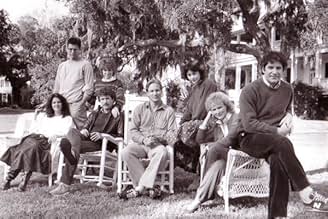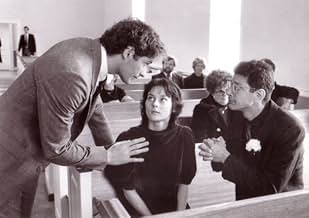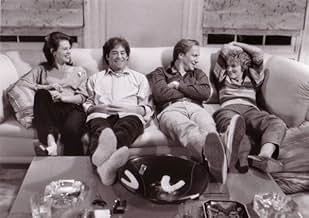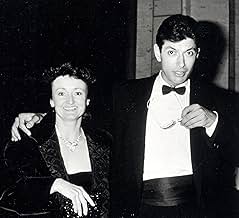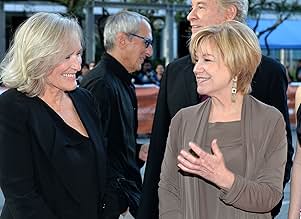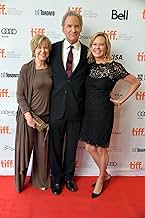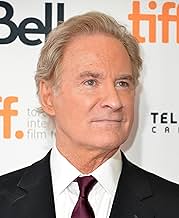Ein Gruppe von Menschen, die zusammen in den 60ern studiert haben, kommt aufgrund eines traurigen Ereignisses zusammen. Sie verbringen ein gemeinsames Wochenende in einem Haus, um über die V... Alles lesenEin Gruppe von Menschen, die zusammen in den 60ern studiert haben, kommt aufgrund eines traurigen Ereignisses zusammen. Sie verbringen ein gemeinsames Wochenende in einem Haus, um über die Vergangenheit sowie die Gegenwart zu reflektieren.Ein Gruppe von Menschen, die zusammen in den 60ern studiert haben, kommt aufgrund eines traurigen Ereignisses zusammen. Sie verbringen ein gemeinsames Wochenende in einem Haus, um über die Vergangenheit sowie die Gegenwart zu reflektieren.
- Regie
- Drehbuch
- Hauptbesetzung
- Für 3 Oscars nominiert
- 3 Gewinne & 8 Nominierungen insgesamt
Jonathan Kasdan
- Harold and Sarah's Son
- (as Jon Kasdan)
Jake Kasdan
- Autograph Seeker
- (as Jacob Kasdan)
Empfohlene Bewertungen
"The Big Chill" is about my peers. When first released in 1983, I, like the characters, was in my early thirties, a former rebellious collegian from the '60s. After a decade in the work-a-day world, being a family man and raising babies, watching "The Big Chill" was like a fantastic time machine and took me back to places long forgotten. It really connected with me on a visceral level and I loved it.
Now, almost twenty years later, I've watched "The Big Chill" again. Same effect? Not exactly, although a lot of this may be due to the effect of viewing any movie a second time. My views of the 60s are not so gilded as they were then either. "The Big Chill" is still a very good movie; you have to love it for the ensemble acting. So many of the actors in the movie went on to have respected careers in the 80s and 90s. It's one of those rare movies like "American Graffiti" and "Diner" that served as a launch pad for acting careers. And the soundtrack is perfect, capturing the breadth of late '60s pop music. I really wish Kasdan had done with these characters, what Updike did with his "Rabbit" novels, that is, show the characters at ten year intervals through their lives.
This is one of the better movies of this type and is highly recommended even for the gen-x'ers.
Now, almost twenty years later, I've watched "The Big Chill" again. Same effect? Not exactly, although a lot of this may be due to the effect of viewing any movie a second time. My views of the 60s are not so gilded as they were then either. "The Big Chill" is still a very good movie; you have to love it for the ensemble acting. So many of the actors in the movie went on to have respected careers in the 80s and 90s. It's one of those rare movies like "American Graffiti" and "Diner" that served as a launch pad for acting careers. And the soundtrack is perfect, capturing the breadth of late '60s pop music. I really wish Kasdan had done with these characters, what Updike did with his "Rabbit" novels, that is, show the characters at ten year intervals through their lives.
This is one of the better movies of this type and is highly recommended even for the gen-x'ers.
A group of seven former college friends gather for a weekend reunion at a South Carolina winter house after the funeral of one of their friends.
In some ways, this film is something like "Secaucus Seven", with various friends who drifted apart getting back together again. These seven had high hopes in the 1960s, but are now becoming disillusioned in the 1970s (with a shoe company named after a Chairman Mao quote and a public defender who has learned that most accused criminals truly are guilty).
Somehow, in the thirty years since this film was released, it has gone under the radar and has been forgotten. Despite many big stars and a notable director (Lawrence Kasdan, a protégé of George Lucas and Steven Spielberg), not to mention a great soundtrack, how has this film become forgotten?
In some ways, this film is something like "Secaucus Seven", with various friends who drifted apart getting back together again. These seven had high hopes in the 1960s, but are now becoming disillusioned in the 1970s (with a shoe company named after a Chairman Mao quote and a public defender who has learned that most accused criminals truly are guilty).
Somehow, in the thirty years since this film was released, it has gone under the radar and has been forgotten. Despite many big stars and a notable director (Lawrence Kasdan, a protégé of George Lucas and Steven Spielberg), not to mention a great soundtrack, how has this film become forgotten?
When I was a student at Cambridge in the early eighties, shortly before "The Big Chill" came out, a friend of mine had a poster on his wall entitled "Woodstock Tenth Anniversary Reunion". (The actual anniversary had taken place in August 1979, not long before we went up). The joke was that those attending the reunion were all middle-class professional types, smartly dressed in lounge suits with well-trimmed short hair. This poster exemplified the way in which my generation saw the baby boomers, twentysomething hippies turned thirtysomething yuppies. Those who still retained their hippie idealism were mercilessly derided as being at least ten years behind the times. (And derided not only by Cambridge students but also by the likes of B. A. Robertson, in his satirical song "Kool in the Kaftan").
"The Big Chill" takes a rather more charitable look at the problems facing those idealists from the 1960s who tried to retain their idealism during the conservative Reagan years of the early 1980s. It features a group of old college friends from the University of Michigan who are reunited after fifteen years. The event which reunites them is the death of Alex, one of the group, who committed suicide while staying at the home of his friends Harold and Sarah. An impromptu reunion occurs as the old friends gather for Alex's funeral.
The precise reasons why Alex killed himself are not spelled out- he did not leave a suicide note- but as the movie progresses we realise that he had become disillusioned with the course his life had taken. (He was a brilliant scientist, but had dropped out of the academic life to become a social worker). His friends also come to realise this, and the realisation prompts them to consider the paths their own lives have taken. Most of the group were involved in the counterculture of the 1960s and the peace movement or other forms of radical politics, but most are now living much more conservative, middle-class lifestyles. Harold is a business executive and his wife Sarah a doctor; they live in an elegant antebellum home in the South. Sam, a one-time radical, has now become a Hollywood actor closely based upon Tom Selleck, down to the moustache. (While watching the film I assumed that Selleck himself was playing the part; it was only when I saw the cast-list that I realised it was actually Tom Berenger). Karen is also now living an affluent lifestyle but is feeling dissatisfied with her husband Richard (who was not one of the college group). Michael, once a radical journalist, now works for the apolitical, celebrity-obsessed "People Magazine". Nick, a Vietnam War veteran, has now become a drug dealer. Apart from their friend's suicide, the question which haunts the group is what became of their youthful idealism?
Contrary to what one might have expected, the film does not take a straightforward "radicalism good, conservatism bad" line. A key scene comes when Nick nearly gets himself arrested by badmouthing the local policeman. Harold, a personal friend of the officer, manages to smooth things out, but then berates Nick for his rudeness and stupidity. To Nick, who still subscribes to the sixties idea that all cops are "pigs" , this may seem like a sellout to the enemy, but I suspect that most of the audience will side with Harold who realises that some of his contemporaries have difficulty in distinguishing between idealism and childishness.
"The Big Chill" has something in common with another movie from the early eighties, Barry Levinson's "Diner" from 1981, which also deals with a reunion of a group of former classmates, although that film is a period piece set in 1959 and the characters are rather younger, being in their twenties rather than their thirties. What the two films have in common is that both are excellent examples of ensemble acting.
This was the second film of its director Lawrence Kasdan (his first was the very different neo-noir thriller "Body Heat") and it starred a number of actors, such as William Hurt and Kevin Kline, who were to become regulars in Kasdan's movies. , (Kevin Costner, originally cast as Alex, was edited out of the final version, but also went on to become a Kasdan regular). There are too may good performances to list them all, but special mentions must go to Kline as Harold, Glenn Close as Sarah and Meg Tilly as Alex's strange, unworldly younger girlfriend Chloe.
One question much discussed on this board is whether the film is "dated". Leaving aside trivial questions of fashion (even in the eighties Tom Berenger's hairstyle must have looked very seventies), I think that it is "dated", but only in the narrow, limited sense that it deals with cultural phenomena such as the sixties counterculture which were very much of their own era. In a wider sense it is not dated because it deals with timeless issues such as love, friendship and the challenge of staying true to one's youthful ideals in later life. (Another eighties film on this theme, although in my view a less successful one, is Fred Schepisi's "Plenty").
I felt that the film was occasionally slow-moving, with too great an emphasis on talk over action. I also wondered whether it might not have been improved by keeping Costner's scenes to allow us to see what sort of a person Alex was and why his death had such a traumatic impact on his friends. Overall, however, I felt that it was a very watchable film, and often a moving one- one that could be watched for pleasure not only by those who are too young to remember the sixties but even those who are too young to remember the eighties. 7/10
"The Big Chill" takes a rather more charitable look at the problems facing those idealists from the 1960s who tried to retain their idealism during the conservative Reagan years of the early 1980s. It features a group of old college friends from the University of Michigan who are reunited after fifteen years. The event which reunites them is the death of Alex, one of the group, who committed suicide while staying at the home of his friends Harold and Sarah. An impromptu reunion occurs as the old friends gather for Alex's funeral.
The precise reasons why Alex killed himself are not spelled out- he did not leave a suicide note- but as the movie progresses we realise that he had become disillusioned with the course his life had taken. (He was a brilliant scientist, but had dropped out of the academic life to become a social worker). His friends also come to realise this, and the realisation prompts them to consider the paths their own lives have taken. Most of the group were involved in the counterculture of the 1960s and the peace movement or other forms of radical politics, but most are now living much more conservative, middle-class lifestyles. Harold is a business executive and his wife Sarah a doctor; they live in an elegant antebellum home in the South. Sam, a one-time radical, has now become a Hollywood actor closely based upon Tom Selleck, down to the moustache. (While watching the film I assumed that Selleck himself was playing the part; it was only when I saw the cast-list that I realised it was actually Tom Berenger). Karen is also now living an affluent lifestyle but is feeling dissatisfied with her husband Richard (who was not one of the college group). Michael, once a radical journalist, now works for the apolitical, celebrity-obsessed "People Magazine". Nick, a Vietnam War veteran, has now become a drug dealer. Apart from their friend's suicide, the question which haunts the group is what became of their youthful idealism?
Contrary to what one might have expected, the film does not take a straightforward "radicalism good, conservatism bad" line. A key scene comes when Nick nearly gets himself arrested by badmouthing the local policeman. Harold, a personal friend of the officer, manages to smooth things out, but then berates Nick for his rudeness and stupidity. To Nick, who still subscribes to the sixties idea that all cops are "pigs" , this may seem like a sellout to the enemy, but I suspect that most of the audience will side with Harold who realises that some of his contemporaries have difficulty in distinguishing between idealism and childishness.
"The Big Chill" has something in common with another movie from the early eighties, Barry Levinson's "Diner" from 1981, which also deals with a reunion of a group of former classmates, although that film is a period piece set in 1959 and the characters are rather younger, being in their twenties rather than their thirties. What the two films have in common is that both are excellent examples of ensemble acting.
This was the second film of its director Lawrence Kasdan (his first was the very different neo-noir thriller "Body Heat") and it starred a number of actors, such as William Hurt and Kevin Kline, who were to become regulars in Kasdan's movies. , (Kevin Costner, originally cast as Alex, was edited out of the final version, but also went on to become a Kasdan regular). There are too may good performances to list them all, but special mentions must go to Kline as Harold, Glenn Close as Sarah and Meg Tilly as Alex's strange, unworldly younger girlfriend Chloe.
One question much discussed on this board is whether the film is "dated". Leaving aside trivial questions of fashion (even in the eighties Tom Berenger's hairstyle must have looked very seventies), I think that it is "dated", but only in the narrow, limited sense that it deals with cultural phenomena such as the sixties counterculture which were very much of their own era. In a wider sense it is not dated because it deals with timeless issues such as love, friendship and the challenge of staying true to one's youthful ideals in later life. (Another eighties film on this theme, although in my view a less successful one, is Fred Schepisi's "Plenty").
I felt that the film was occasionally slow-moving, with too great an emphasis on talk over action. I also wondered whether it might not have been improved by keeping Costner's scenes to allow us to see what sort of a person Alex was and why his death had such a traumatic impact on his friends. Overall, however, I felt that it was a very watchable film, and often a moving one- one that could be watched for pleasure not only by those who are too young to remember the sixties but even those who are too young to remember the eighties. 7/10
10kal1
After reading several of the user comments on this movie, it is clear that many people missed quite a bit. Those "funny one-liners" (and there are plenty!) are much more than that: they tell us volumes about the characters. This movie certainly does not spell anything out to the viewer (except, perhaps, the obvious), so you must be able to find the meaning behind the words. If you listen to what the characters are saying, then you can understand their past relationships, their present feelings, which friends have stayed close, etc. Remember, these are old friends: the script is very realistic so the characters are not going to explain every line to one another. I believe to truly enjoy this movie you need to pay close attention to all of the details and understand a bit about the attitudes and ideals of the two eras the movie depicts.
Wonderful, intelligent movie!
Wonderful, intelligent movie!
"The Big Chill" is often regarded as the best Hollywood movie to demonstrate ensemble acting. A problem that can affect similar films is the unequal division of time that each character receives, but "The Big Chill" avoids this problem. It certainly is a moving cinematic experience that isn't easily forgotten. OK it doesn't really lead anywhere, but as it goes on, the nostalgic charm sets in and the core isn't hollow.
Terrific performances from the ensemble cast who work well as a group. It's ironic how Kevin Costner had the most successful career yet if you blink you'll miss him. Some of the careers of the talented cast bloomed after this- Kevin Kline won an Oscar for "A Fish Called Wanda", Glenn Close got 5 nominations (this film included) and got a status in Hollywood, Jeff Goldblum got success in the likes of "Jurassic Park" and "Independence Day". Others didn't- Meg Tilly sort of disappeared, JoBeth Williams went on to flops such as Stop Or My Mom Will Shoot, Mary Kay Place had small parts in Girl Interupted and Being John Malkovich but went by un-noticed.
"The Big Chill" is a complex and often brilliant story of the need for companionship. The soundtrack greatly adds to the nostalgic and uplifting feel to the movie. Great performances, splendid direction and an engaging script make this a deserved (if not slightly dated) classic. My IMDb rating: 8.0/10.
Terrific performances from the ensemble cast who work well as a group. It's ironic how Kevin Costner had the most successful career yet if you blink you'll miss him. Some of the careers of the talented cast bloomed after this- Kevin Kline won an Oscar for "A Fish Called Wanda", Glenn Close got 5 nominations (this film included) and got a status in Hollywood, Jeff Goldblum got success in the likes of "Jurassic Park" and "Independence Day". Others didn't- Meg Tilly sort of disappeared, JoBeth Williams went on to flops such as Stop Or My Mom Will Shoot, Mary Kay Place had small parts in Girl Interupted and Being John Malkovich but went by un-noticed.
"The Big Chill" is a complex and often brilliant story of the need for companionship. The soundtrack greatly adds to the nostalgic and uplifting feel to the movie. Great performances, splendid direction and an engaging script make this a deserved (if not slightly dated) classic. My IMDb rating: 8.0/10.
Wusstest du schon
- WissenswertesKevin Kline met future wife Phoebe Cates when she auditioned for the part of Chloe.
- PatzerHarold tells Nick that a big company is going to buy his company, so Nick should trade on that info so he can clean up his life. Harold also gives that info to Alex, and Alex was able to leverage that info to make the money that he used to buy the house. Alex couldn't have profited from that info, because it hadn't happened, yet.
- Alternative VersionenCBS edited 6 minutes from this film for its 1986 network television premiere.
- VerbindungenEdited into The Pitchfork Retreat
- SoundtracksI Heard It Through the Grapevine
Written by Norman Whitfield and Barrett Strong
Performed by Marvin Gaye
Courtesy of Motown Records and Jobete Music
Top-Auswahl
Melde dich zum Bewerten an und greife auf die Watchlist für personalisierte Empfehlungen zu.
- How long is The Big Chill?Powered by Alexa
Details
- Erscheinungsdatum
- Herkunftsland
- Sprache
- Auch bekannt als
- Reencuentro
- Drehorte
- Produktionsfirmen
- Weitere beteiligte Unternehmen bei IMDbPro anzeigen
Box Office
- Budget
- 8.000.000 $ (geschätzt)
- Bruttoertrag in den USA und Kanada
- 56.399.659 $
- Eröffnungswochenende in den USA und in Kanada
- 3.662.152 $
- 2. Okt. 1983
- Weltweiter Bruttoertrag
- 56.399.792 $
Zu dieser Seite beitragen
Bearbeitung vorschlagen oder fehlenden Inhalt hinzufügen




